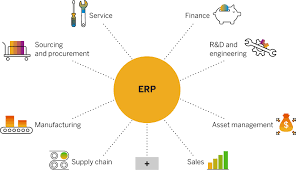Enterprise Resource Planning (ERP) systems are essential for businesses to streamline their operations and automate various functions. These systems provide integrated solutions for different business processes, such as finance, inventory, manufacturing, and human resources. The different types of ERP cater to various industries and organizational requirements. Here, we will discuss some of the different types of ERP systems and their features.
On-Premise ERP
On-Premise ERP is a traditional software that is installed on a company’s internal servers and infrastructure. This type of ERP requires dedicated IT staff and resources to maintain and upgrade. The main advantage of On-Premise ERP is that it provides more control over data and customization options, but the implementation and maintenance costs can be higher.
Cloud ERP
Cloud ERP is a modern and flexible ERP that operates on cloud-based servers. This type of ERP eliminates the need for an on-premise server and hardware maintenance, and upgrades are handled by the provider. Cloud ERP is scalable, customizable, and can be accessed from anywhere with an internet connection. It is suitable for businesses of all sizes and industries.
Industry-Specific ERP
Industry-specific ERP is designed for specific industries, such as healthcare, construction, or retail. These systems provide pre-configured industry-specific processes and workflows. Industry-specific ERP is beneficial for companies with unique requirements and regulations in their respective industries.
Open-Source ERP
Open-Source ERP is a type of ERP system that allows businesses to modify the source code of the software. It is free to use and can be customized according to the organization’s requirements. Open-Source ERP is suitable for businesses that have in-house IT expertise and want more control over their ERP system.
Mobile ERP
Mobile ERP provides access to ERP functionalities on mobile devices such as smartphones and tablets. It is suitable for businesses with mobile workforces, enabling employees to access ERP data from anywhere at any time. Mobile ERP can be integrated with other systems and customized according to business requirements.
Two-Tier ERP
Two-Tier ERP is a hybrid solution that combines an existing ERP system with a secondary ERP system. This type of ERP is suitable for companies with global operations and subsidiaries that need to operate with different ERP systems in different locations. The primary ERP system manages central operations, while the secondary ERP system caters to subsidiary operations.
Different types of ERP systems cater to specific business needs, industries, and budgets. Choosing the right type of ERP is essential for businesses to improve efficiency, productivity, and profitability. Companies should evaluate their requirements and budget before selecting an ERP system that aligns with their business goals.
ERP or Enterprise Resource Planning systems are designed to provide a centralized platform for managing various business processes and operations. Here are some of the key functions of ERP systems:
Financial Management: ERP systems provide a comprehensive financial management module that automates various financial processes, such as accounts payable, accounts receivable, general ledger, and financial reporting.
Sage 50
Oracle NetSuite
SAP Business One
Supply Chain Management: ERP systems enable businesses to manage their supply chain processes, such as procurement, inventory management, and order fulfillment. This helps to ensure that materials and products are available when needed, and supply chain disruptions are minimized.
SAP Ariba
Oracle SCM Cloud
Infor Supply Chain Management
Microsoft Dynamics 365 Supply Chain Management
Epicor ERP
Manufacturing Management: ERP systems streamline the manufacturing processes, from planning and scheduling to production and quality control. This helps businesses to optimize production, reduce waste, and improve product quality.
Plex
JobBOSS
IQMS
Infor CloudSuite Industrial
SYSPRO
Human Resource Management: ERP systems provide a suite of HR modules, including employee data management, payroll processing, benefits administration, and performance evaluation. This helps businesses to manage their workforce effectively and efficiently.
Workday HCM
SAP SuccessFactors
Oracle HCM Cloud
ADP Workforce Now
BambooHR
Customer Relationship Management: ERP systems provide a customer relationship management (CRM) module that enables businesses to manage customer interactions, sales, and marketing. This helps businesses to improve customer satisfaction, retention, and sales.
Salesforce
Microsoft Dynamics 365 Sales
HubSpot
Zoho CRM
Pipedrive
Business Intelligence and Reporting: ERP systems provide tools for data analysis, reporting, and business intelligence. This helps businesses to gain insights into their operations, identify opportunities for improvement, and make informed decisions.
Microsoft Power BI
Tableau
QlikView
IBM Cognos Analytics
SAP Analytics Cloud
ERP systems provide a suite of functions that enable businesses to manage their operations effectively and efficiently. These functions cover various business processes, from financial management to supply chain, manufacturing, human resources, customer relationship management, and business intelligence.




